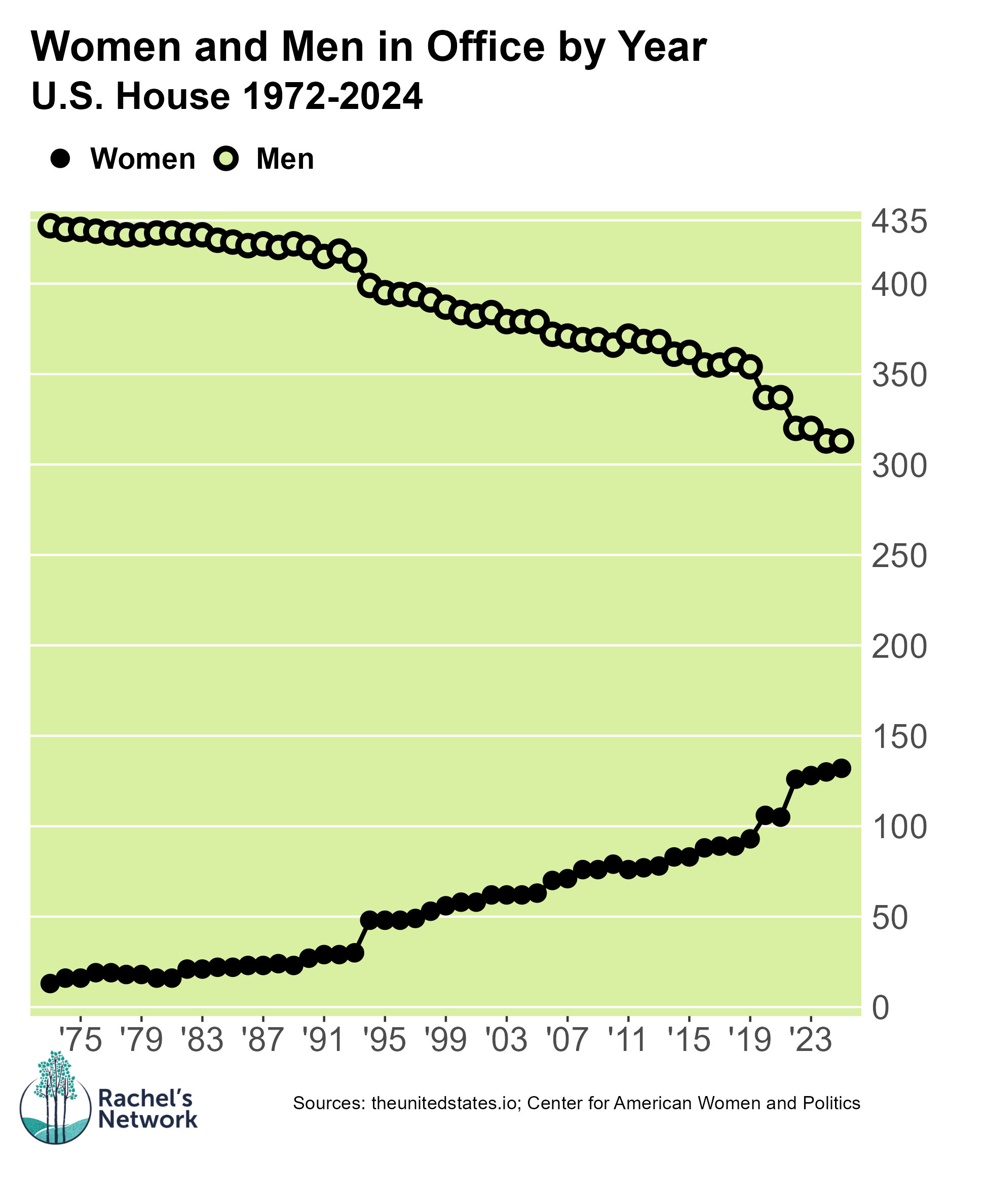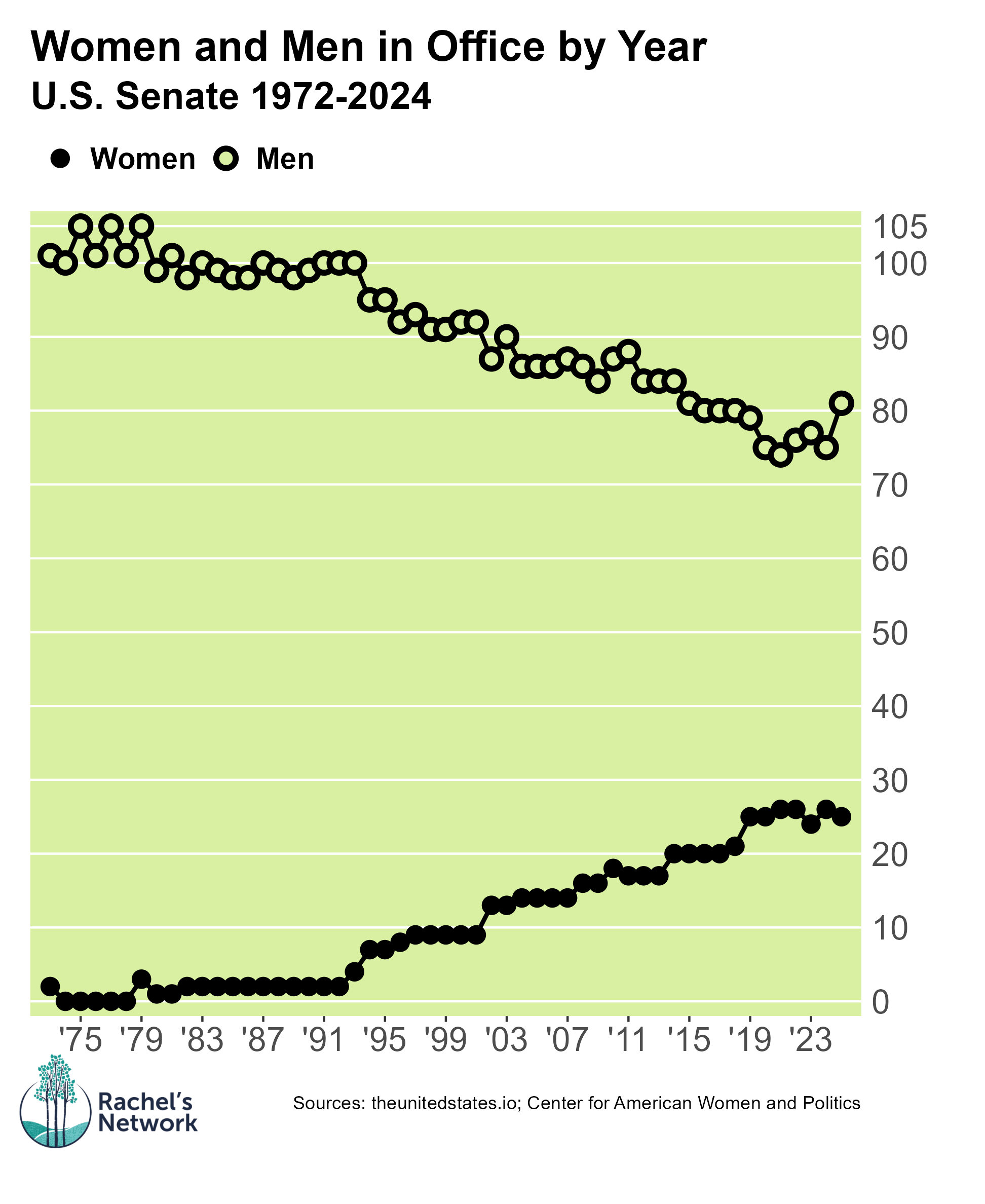
In 2025, women hold 151 seats in Congress. Despite major gains in the past decade, women are still significantly underrepresented in federal policymaking. By some estimates, it could take over a century at the current rate for our legislature to achieve equal representation.
Statistics conveyed by organizations like the Center for American Women in Politics and the Institute for Women’s Policy Research highlight this disparity: women comprise roughly 51 percent of the population and 53 percent of the electorate but only 28 percent of Congress. Women of color currently hold 10 percent of seats in Congress despite comprising roughly 20 percent of the country’s population.
Women are not the only constituency impacted by unequal representation—our entire policymaking process suffers.
Since 2000, Rachel’s Network has made the case that gender disparity in government not only stymies equality, it has serious implications for environmental policy as well.
Research in the European Journal of Political Economy found that female representation in national legislatures leads countries to adopt more stringent climate change policies. 91 countries were included in the study.
Similarly, a 2019 study in the Journal of Environmental Politics, a 2019 study in the Review of Policy Research, a 2022 study in the European Journal of Political Research, and a 2025 study in Kybernetes found that women’s political representation correlates with better environmental policies and outcomes.
In previous iterations of our report When Women Lead (in 2003 and 2011), we analyzed the voting records of federal legislators going back to 1983 using League of Conservation Voters (LCV) Environmental Scorecard data. We found that women in Congress vote for legislation supporting clean air, clean water, renewable energy, climate action, and public health much more often than their male counterparts (and similarly vote more often against legislation that would roll back these protections).
This update brings our analysis up to the present, looks further into the past, and includes demographic breakdowns by race and ethnicity. After comparing annual LCV scores each year from 1972-2024, we found that women legislators—especially women of color legislators—vote for environmental protections more often than their male counterparts in both the House and Senate.
Climate change, pollution, food and energy justice, chemical safety, and biodiversity loss have become urgent global concerns that threaten lives and livelihoods in the US. If we want to make progress on protecting the environment and public health, we should help elect more women—especially women of color—to public office, and support them during their tenure.

Women’s Environmental Voting Records in the House of Representatives
In the US House of Representatives, women have had higher average environmental scores in every year that LCV has kept records. Women’s average annual score from 1972-2024 is 69 while men’s is 45.
Women of color have the highest combined average annual LCV score of any demographic group in the House at 85 (see race and ethnicity breakdown here).
Within each political party, the gender discrepancy persists, although it’s less pronounced and shrinking in recent years. The average scores of Democratic women surpass those of Democratic men in nearly every year since 1972 and their average is much higher: 89 vs 70. Since 2003, the scores of Republican women in the House have roughly tracked Republican men’s scores, but their overall average since 1972 is 21 compared to men’s 19.
Women with Perfect Environmental Scores in the House in 2024
Alma Adams (NC), Becca Balint (VT), Joyce Beatty (OH), Lisa Blunt Rochester (DE), Suzanne Bomici (OR), Julia Brownley (CA), Kathy Castor (FL), Judy Chu (CA), Katherine Clark (MA), Yvette Clarke (NY), Madeleine Dean (PA), Diana DeGette (CO), Rosa DeLauro (CT), Debbie Dingell (MI), Veronica Escobar (TX), Valerie Foushee (NC), Lois Frankel (FL), Sylvia Garcia (TX), Jaha Hayes (CT), Sheila Jackson Lee (TX), Sara Jacobs (CA), Pramila Jayapal (WA), Sydney Kamlager-Dove (CA), Robin Kelly (IL), Erica Lee Carter (TX), Summer Lee (PA), Teresa Leger Ferndez (NM), Zoe Lofgren (CA), Jennifer McClellan (VA), Betty McCollum (MN), LaMonica McIver (NJ), Grace Napolitano (CA), Eleanor Holmes Norton (DC), Ilhan Omar (MN), Chellie Pingree (ME), Delia Ramirez (IL), Deborah Ross (NC), Andrea Salinas (OR), Linda Sanchez (CA), Mary Scanlon (PA), Janice Schakowsky (IL), Haley Stevens (MI), Jill Tokuda (HI), Lauren Underwood (IL), Maxine Waters (CA), Bonnie Watson Coleman (NJ), Jennifer Wexton (VA), Nikema Williams (GA), Frederica Wilson (FL)
Clean water is the foundation of a healthy community and a TOP issue I hear about from local leaders. I am so proud to deliver $200k in federal funds to Crest Hill to move their water infrastructure projects forward.
— Rep. Lauren Underwood (@underwood.house.gov) March 13, 2025 at 2:26 PM
[image or embed]
Whether I'm on North Haven or working down in Washington, Maine's iconic coast is always top of mind. Sadly, our coastal communities face unprecedented challenges due to climate change. Read about how my journey as a back-to-the-lander led me to Congress—and how I'm fighting for Maine's future. 👇
— Congresswoman Chellie Pingree (@chelliepingree.bsky.social) March 31, 2025 at 2:51 PM
[image or embed]
Women’s Environmental Voting Records in the Senate
Just as in the House of Representatives, women’s annual average LCV score in the Senate since 1972 is higher than men’s overall (67 vs 45) and within each party (D: 87 vs 71; R: 27 vs 19).
Year by year, the picture is more complicated, primarily because comparatively few women—and even less women of color—have served in the Senate. From 1973-1977, no women served at all, and until 1991, only 1 or 2 women served at any one time. To put it another way, pre-1991 averages account for the scores of 98-99 men vs 1 or 2 women. The large swings in LCV scores in earlier years are partly due to this small sample size. Meanwhile, only nine women of color have served in the Senate in its entire history. Women of color have the highest combined average annual LCV score of any group in the Senate at 94.
Women with Perfect Environmental Scores in the Senate in 2024
Tammy Baldwin (WI), Laphonza Butler (CA), Maria Cantwell (WA), Catherine Cortez Masto (NV), Tammy Duckworth (IL), Kirsten Gillibrand (NY), Margaret Hassan (NH), Mazie Hirono (HI), Amy Klobuchar (MN), Patty Murray (WA), Jacky Rosen (NV), Jeanne Shaheen (NH), Tina Smith (MN), Debbie Stabenow (MI), and Elizabeth Warren (MA)
1/ Environmental reviews need to be based on science, not political tradeoffs, otherwise they won’t withstand judicial scrutiny. Industrialization of fragile Arctic ecosystems, like climate change, is irreversible and irresponsible to future generations. https://t.co/PZC87GG3zH
— Sen. Maria Cantwell (@SenatorCantwell) February 3, 2023
Proud to join EPA Regional Administrator Martha Guzman to announce $4M in funding awarded to the City & County of Honolulu and State of Hawaii to combat climate change, as well as the new national $7B Solar for All Program that could help Hawaii achieve our clean energy goals. pic.twitter.com/fAmoVC1EGa
— Senator Mazie Hirono (@maziehirono) July 8, 2023
“We’ve got to get more women to run. We need to be strategic and identify women to run in open seats at every level of leadership. And once those women are recruited, we need to make sure that they have the support, financial and otherwise, to be successful.”
Solutions
We can close the gender gap and make a difference for the environment by following these suggestions from fellow advocates:
About Rachel’s Network
Rachel’s Network is a community of women at the intersection of environmental advocacy, philanthropy, and leadership. Our mission is to promote women as impassioned leaders and agents of change dedicated to the stewardship of the earth.
About Rachel’s Action Network
Rachel’s Action Network (RAN), is a national 501(c)4 dedicated to leveraging women’s philanthropy to advance strong environmental policies and promote women policy and political leaders.
Methodology
When Women Lead uses the following datasets:
1. The League of Conservation Voters (LCV) Scorecard, which compiles federal legislator votes on bills including clean air and water, energy, climate change, environmental justice, public health, public lands and wildlife conservation, democracy, worker protection, and spending for environmental programs (methodology here).
2. The Center for American Women & Politics (CAWP) tally of Women Officeholders by Race and Ethnicity (methodology here).
3. the @unitedstates project, a shared commons of data and tools for the United States.
Complete this form to request the compiled data that was used in this report.
Photo: Wikimedia Commons; Not authorized by any candidate or candidate’s committee.
